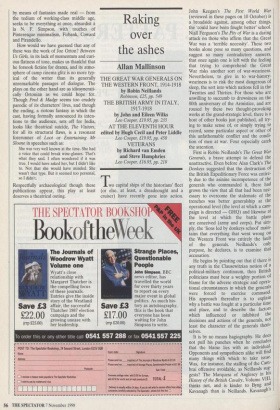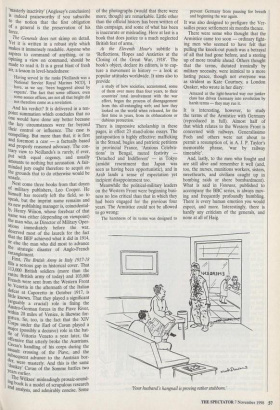Raking over the ashes
Allan Mallinson
THE GREAT WAR GENERALS ON THE WESTERN FRONT, 1914-1918 by Robin Neillands
Robinson, £25, pp. 549 THE BRITISH ARMY IN ITALY, 1917-1918 by John and Eileen Wilks Leo Cooper, .£19.95, pp. 235 AT THE ELEVENTH HOUR edited by Hugh Cecil and Peter Liddle Leo Cooper, £19.95, pp. 450 VETERANS by Richard van Emden and Steve Humphries Leo Cooper, £16.95, pp. 210 Two capital ships of the historians' fleet (or else, at least, a dreadnought and a cruiser) have recently gone into action. John Keegan's The First World War (reviewed in these pages on 10 October) is a broadside against, among other things, the 'could have been fought better' school. Niall Ferguson's The Pity of War is a daring attack on those who affirm that the Great War was a 'terrible necessity'. These two books alone pose so many questions, and suggest so many contradictory answers, that once again one is left with the feeling that trying to comprehend the Great War risks another sort of war-weariness. Nevertheless, to give in to war-history- weariness is to risk the most dangerous of sleep, the sort into which nations fell in the Twenties and Thirties. For those who are unwilling to succumb to drowsiness on the 80th anniversary of the Armistice, and are roused by these two thought-provoking works at the grand-strategic level, there is a host of other books just published, all try- ing to make sense of, or simply trying to record, some particular aspect or other of this unfathomable conflict and the condi- tion of men at war. Four especially catch the attention.
First is Robin Neillands's The Great War Generals, a brave attempt to defend the unattractive. Even before Alan Clark's The Donkeys suggested that the destruction of the British Expeditionary Force was entire- ly due to the asinine incompetence of the generals who commanded it, there had grown the view that all that had been nec- essary to overcome the stalemate of the trenches was better generalship at the operational level (the level at which a cam- paign is directed — GHQ) and likewise at the level at which the battle plans are conceived (army and corps). Put sim- ply, the 'lions led by donkeys school' main- tains that everything that went wrong on the Western Front was entirely the fault of the generals. Neillands's onlY purpose, he declares, is to examine that accusation.
He begins by pointing out that if there is any truth in the Clausewitzian notion of a political-military continuum, then British politicians must bear a weighty portion of blame for the adverse strategic and opera- tional circumstances in which the generals were forced to exercise command. His approach thereafter is to explain why a battle was fought at a particular time and place, and to describe the factors which influenced or inhibited the decisions and actions of the generals, not least the character of the generals them- selves.
It is by no means hagiography. He does not pull his punches when he concludes that the blame lies with an individual. Opponents and sympathisers alike will find many things with which to take issue. Was, for instance, the stalling of the Cam- brai offensive avoidable, as Neillands sug- gests? The Marquess of Anglesey in his History of the British Cavalry, Volume VIII, thinks not, and is kinder to Byng and Kavanagh than is Neillands. Kavanagh s 'masterly inactivity' (Anglesey's conclusion) is indeed praiseworthy if you subscribe to the notion that the first obligation of a general is the preservation of his force.
The Generals does not skimp on detail. Yet it is written in a robust style which Makes it immensely readable. Anyone who aspires to command of anything, or to opining a view on command, should be made to read it. It is a great blast of fresh air, a lesson in level-headedness: Having served in the ranks [Neillands was a National Service Royal Marines NCO], I have, as we say, 'been buggered about by experts'. The fact that some officers, even some senior offices, are not all that bright did
• not therefore come as a revelation.
And his verdict? It is delivered in a ten- point summation which concludes that no one would have done any better because the . key circumstances were far beyond their control or influence. The case is Compelling. But more than that, it is first and foremost a case — a factually based and properly reasoned advocacy. The con- trary view to Neillands's is rarely, if ever, put with equal cogency, and usually amounts to nothing but accusation. A fair- minded jury ought therefore to acquit on the grounds that to do otherwise would be unsafe.
Next come three books from that doyen of. military publishers, Leo Cooper. He himself has recently left the field, so to Speak, but the imprint name remains and its , new publishing manager is, coincidental- 1Y, Henry Wilson, whose forebear of that name was either (depending on viewpoint) the man who, as Director of Military Oper- ations immediately before the war, deserved most of the laurels for the fact that the BEF achieved what it did in 1914, or else the man who did most to advance the strategic disaster of Anglo-French entanglement. First, The British Army in Italy 1917-18 Ills a serious gap in historical cover. That 113,0(J0 British soldiers (more than the entire British army of today) and 103,000 French were sent from the Western Front to Venetia in the aftermath of the Italian defeat at Caporetto in October 1917, is little known. That they played a significant (arguably a crucial) role in fixing the A.ustro-German forces in the Piave River, Within 20 miles of Venice, is likewise for- gotten. So, too, is the fact that the XIV Corps under the Earl of Cavan played a airn• (possibly a decisive) role in the bat- of Vittorio Veneto a year later, the nriensive that utterly broke the Austrians. Lavan's handling of his corps during the assault crossing of the Piave, and the Subsequent advance to the Austrian bor- ,cler, were masterly. And this is the same donkey Cavan of the Somme battles two Years earlier.
i„ e Wilkses' misleadingly prosaic-sound- a-g book is a model of scrupulous research nri analysis, and admirably concise. Some of the photographs (would that there were more, though) are remarkable. Little other than the official history has been written of this campaign, and some of what has been is inaccurate or misleading. Here at last is a book that does justice to a much neglected British feat of arms.
At the Eleventh Hour's subtitle is 'Reflections, Hopes and Anxieties at the Closing of the Great War, 1918'. The book's object, declare its editors, is to cap- ture a movement in history — a look at popular attitudes worldwide. It aims also to provide
a study of how societies, accustomed, some of them over more than four years, to their countries' total involvement with the war effort, began the process of disengagement from this all-entangling web; and how they looked on the world when released, for the first time in years, from its obfuscations or dubious protection.
There is impressive scholarship in these pages, in effect 23 stand-alone essays. The juxtaposition is highly effective: mafficicing in the Strand, bugles and patriotic petitions in provincial France, 'Anxious Celebra- tions' in Bengal, muted festivity — 'Detached and Indifferent' — in Tokyo (amidst resentment that Japan was seen as having been opportunistic), and in Arab lands a sense of expectation yet incipient disappointment too.
Meanwhile the political-military leaders on the Western Front were beginning busi- ness no less critical than that in which they had been engaged for the previous four years. The Armistice could not be allowed to go wrong:
The harshness of its terms was designed to prevent Germany from pausing for breath and beginning the war again.
It was also designed to prefigure the Ver- sailles peace settlement six months thence.
There were some who thought that the Armistice came too soon — ordinary fight- ing men who seemed to have felt that pulling the knock-out punch was a betrayal of all that had gone before, and a storing up of more trouble ahead. Others thought that the terms, dictated ironically by military necessity, were inimical to a more lasting peace, though not everyone was as strident as Kate Courtney, a London Quaker, who wrote in her diary:
Amazed at the light-hearted way our junker class has driven Germany into revolution by harsh terms — they may rue it.
It is interesting, however, to study the terms of the Armistice with Germany (reproduced in full). Almost half of that which relates to the Western Front is concerned with railways. Generalissimo Foch and others were not about to permit a resumption of, in A. J. P. Taylor's memorable phrase, 'war by railway timetable'.
And, lastly, to the men who fought and are still alive and remember it well (and, too, the nurses, munitions workers, sisters, sweethearts, and civilians caught up in bombing raids or shore bombardment). What is said in Veterans, published to accompany the BBC series, is always mov- ing and frequently profoundly humbling. There is every human emotion you would expect, and more. Interestingly, there is hardly any criticism of the generals, and none at all of Haig.
Your husband's hangnail is proving rather stubborn.'



















































































 Previous page
Previous page